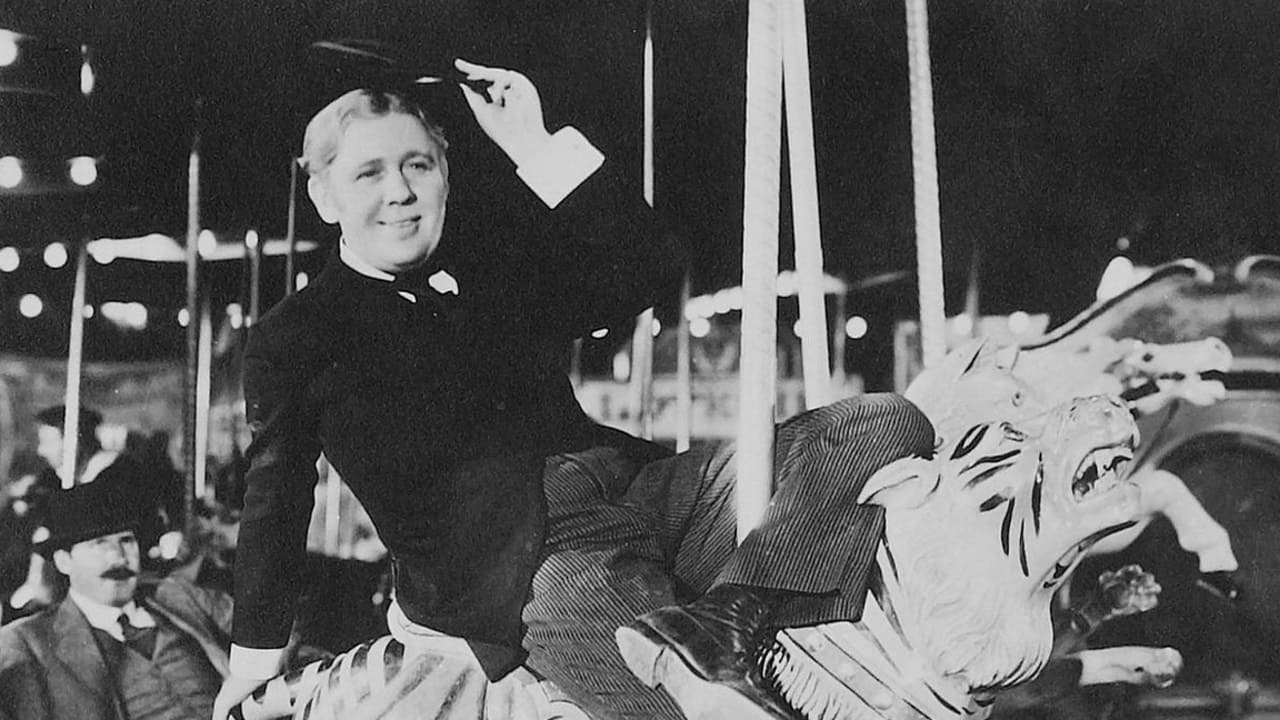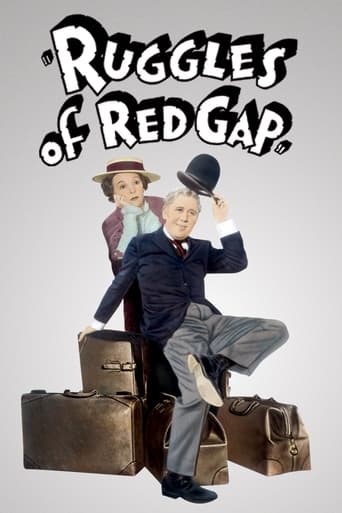MonsterPerfect
Good idea lost in the noise
Lollivan
It's the kind of movie you'll want to see a second time with someone who hasn't seen it yet, to remember what it was like to watch it for the first time.
Sanjeev Waters
A movie that not only functions as a solid scarefest but a razor-sharp satire.
mike48128
A "fish out of water" 1930's comedy with Charles Laughton as an English Butler "won" in a poker game and brought to America against his will. A great supporting cast with the personas of Zazu Pits, Charles Ruggles and many others. It is set in 1908 in a "rural town" just coming out of the "frontier". No decent restaurant with "grub" at the saloon, so the displaced butler starts one. ( I am surprised that a local hotel or boarding house doesn't serve decent food?) "The Gettysburg Address" is recited as well! It reminds me of the Brit sit-com "Keeping Up Appearances" as a most "common" lady tries to put-on social "airs". Well-directed by the man who brought us "Going My Way" and other more classical tales. Most engaging with only a little "slapstick" at the very end. Made 4 times on film and the basic concept "recycled" numerous times in other movies and TV shows. Quite enjoyable, but I don't feel the need to own it.
kurosawakira
Leo McCarey's "Ruggles of Red Gap" (1935) is a fantastic comedy that has an expertly conceived, slowly unfolding narrative built above all things on the strength of the whole cast.The film largely revolves around the notion of opposites: overstated in gesture, understated in gesture; extrovert, introvert; brotherly intimacy, respectful distance. Laughton and Young abide always in the latter, Charles Ruggles (playing Egbert) and the rest of the Americans inhabit the former. All of these traits of characterization are then blown out of proportion, and both the comedy and underlying humanity is activated when these two extremes are first juxtaposed and then merged into one another: Ruggles' (not Charles but Laughton's character) drunkenness, the Earl's fascination with playing drums, and then the seminal moment toward the end where he quotes Lincoln. While it is Ruggles who's whipsawed by this cultural counterpoint the most, my favourite moments still go to the Earl, beautifully understated, and to Egbert, who is kindness and well-intentioned independence embodied.But this is so much more than just stereotype-floundered, exploitative farce. There's great humanity all around, and this balance is able to produce strong emotional responsiveness and identification either way – be it Egbert meeting his friend on the street in Europe, or Ruggles or the Earl refusing to open their social space. The characters are revealed as human and humane. Perhaps the payoff in the end rubs it a bit too much on my nose, but on the other and it's completely justified in the context of the film.
st-shot
After being "lost" in a game of poker to a wealthy but indecorous American, gentleman's gentleman Marmaduke Ruggles finds himself in the throes of culture shock as he resettles in the wild west with his new employers. Steeped in the tradition of the European class system he is at first aghast at the lack of boundaries between servant and employer but soon begins to adapt to the land of opportunity.Ruggles of Red Gap is a non-stop good natured screwball satire that fills every minute of its running time with comic situations played with gusto by a cast of broad lovable characters. Leo Mccarey's lightening paced direction insures that there is never a dull moment as he good naturedly takes pokes at pretense, hypocrisy and ugly Americans on the continent while slyly celebrating the fruits of Democracy and the American way.Charles Laughton in the midst of a year (Bligh in Mutiny, Jalvert in Les Misrabelais) that would have made any actor's career distinguished is howlingly funny as Ruggles. Whether stiffly attempting to maintain decorum, mutely observing or getting drunk with the boys Laughton's antics remain uproariously comic. Then in the middle of all the zaniness McCarey injects sober relief by having Laughton recite Lincoln's Gettysburg Address in a bar. In the voice of Laughton it deftly avoids mawkish mood killing and soars, soberly driving home McCarey's paradoxically subversive but patriotic rights of man theme.Ably assisting Laughton's tour de force Charles Ruggles, Marie Boland, Zasu Pitts and Roland Young produce their fair share of laughs while McCarey's swift and tight direction gallops along in perfect stride. Ruggles of Red Gap is one of the best made comedies to come out of the thirties.
bkoganbing
Ruggles of Red Gap is the warm and tender story of Charles Laughton, gentlemen's gentlemen to Lord Roland Young who loses his services in a poker game to American western tourist Charlie Ruggles and his wife Mary Boland. Ruggles has some ideas about class distinction and one's proper place in society and he's in for quite a culture shock when he's brought back to the western town of Red Gap in Washington State.In a way Ruggles of Red Gap is the polar opposite of The Earl of Chicago where an American gangster Robert Montgomery inherits an English title and experiences a reverse culture shock. In that film Montgomery has an English valet in Edmund Gwenn who indoctrinates him in reverse of what Laughton experiences. Of course things turn out a whole lot better for Marmaduke Ruggles than for the Earl of Kinmont.In a way Ruggles of Red Gap may have been Charles Laughton's most personal film. In his life he became an American citizen because he preferred the American view of no titles of nobility and that one had better opportunities here than in Europe. It caused a certain amount of friction between Laughton and some other British players.Laughton up to then had played a whole lot of bigger than life parts like Nero, Henry VIII, Captain Bligh, Edward Moulton Barrett, parts that called for a lot of swagger. Marmaduke Ruggles is a different kind of man. Self contained, shy, and unsure of himself in new surroundings. But Laughton pulls it off beautifully. It's almost Quasimodo without the grotesque make up. Also very much like the school teacher in This Land is Mine.Charlie Ruggles and Mary Boland never fail to entertain, they worked beautifully together in a number of films in the early Thirties. They always were a married couple, Boland a very haughty woman with some exaggerated ideas of her own importance and her ever patient and somewhat henpecked husband Charlie. In Ruggles of Red Gap, Charlie Ruggles is a little less henpecked.My guess is that Zasu Pitts played the role she did because Elsa Lanchester might have been busy elsewhere. I believe she was making the Bride of Frankenstein around this time. Pitts's scenes with Laughton resonate the same way as some of Charles Laughton's best work with his wife.The highlight of Ruggles of Red Gap has always been Laughton's recital of The Gettysburg Address. In a scene in a saloon where none of the American born people can remember anything of Lincoln's Gettysburg Address, Laughton the immigrant recited it from memory. It was a harbinger of some of Laughton's later recitals which I remember as a kid on the Ed Sullivan show. The scene is a tribute to all the immigrants who come here because of the ideals this country is supposed to represent. Sometimes our immigrants have taken it more seriously than those who were born here. Immigrants like Charles Laughton.

